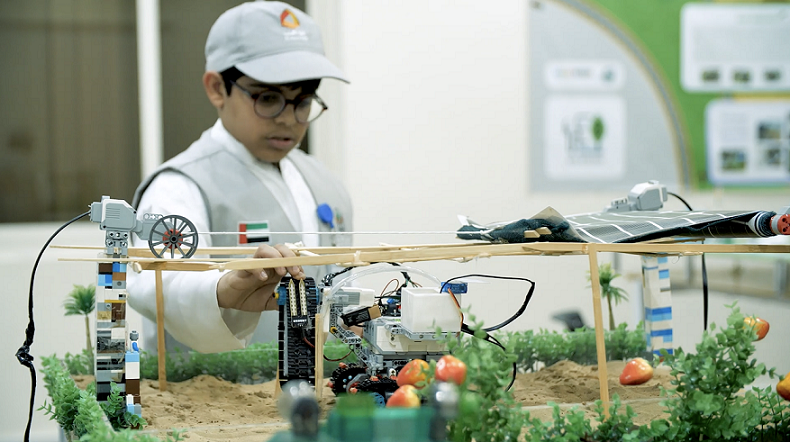Following three days of intense online competitions at the UAE World Robot Olympiad (WRO), seven winning teams have been selected to represent the UAE at the international World Robot Olympiad competition, announced the Abu Dhabi Department of Education and Knowledge (ADEK).
Organized by the WRO Association, the World Robot Olympiad will be held virtually from 18-21 November 2021, qualifying teams from across the globe will represent their countries in three categories themed around renewable energy.
The national event organizer, ADEK, invited all Public, Private, Charter Schools, as well as universities to take part in the national qualifier. With 308 teams participating in the UAE-WRO, judges were assigned assessment of the different categories depending on their professional experience. In the Open Category, teams were invited to make a ten-minute pitch presentation of their project to the judging panel and were tested on their knowledge and understanding of their respective entries.
In the Regular and Future Engineers categories, teams were asked to upload videos of their projects which were assessed by the judges against criteria including innovation, operations, and timeliness.
The top three winners selected from each category, following the first round of judging, were put through to a second judging stage designed to test integrity and ensure that the selected projects met the competition’s strict standards and requirements and that the winning teams were suitable to represent the UAE in the international final.
A total of 21 teams won the coveted top three spots in the competition’s Open, Regular, and Future Engineers categories across seven different age categories. The winning UAE teams comprise 19 students and Five coaches at the World Robot Olympiad finals under the slogan ‘Powerbots; the Future of Energy’.
The UAE-WRO Open ElementaryCategory was won by Hassan Abdallah Hassan, Ali Humaid Al-Ali, and their coach, who presented Smart Farm; an innovative project that uses solar-powered robots to carry out labor at farms of the future.
In the Open Junior Category, Saif Hassan Karam, Abdelaziz Faisal Al-Ali, and Sultan Abdalla Ali Bin Khalfan Alzaabi won for their Eco Stations project, which uses solar panels to operate a battery-powered delivery fleet to supply batteries to electric vehicles. Finally, in the Open Senior Category, Moza Almazrouei and Mariam Almazrouei presented a smart clean energy waste management solution that monitors garbage bins to map out the garbage truck routes; the smart system minimizes the garbage collection footprint enhancing operational efficiencies.
Winning teams from the additional categories impressed judges with their entries; in the Regular Elementary Category, Saif Fahad Ibrahim Almazmi, Naser Ahmed Mohamed Almohairy, and Abdelrahman Mohammed Ali Saeed were challenged to create a robot that could traverse obstacles and replace damaged light bulbs based on a specific color code. In the Regular Junior Category, Fares Ahmed Jasim AlnajarAlHammadi, Ahmed Abdulla Mohammed Tarish Khamis, and Omar Mubarak Ali successfully built and programmed a mini robot able to negotiate its way around a 12-car toy parking lot and park electric, hybrid and traditional cars in allocated parking spaces. In the Regular Senior Category, Khan Ayaan, Raghav Arya, and Saurav Guptedesigned an autonomous cube robot capable of navigating obstacles to charge home appliances harnessing solar, wind, and waterpower.
Additionally, in the future Engineers Category, Team Apollo; Abhay Sivakumar, Yash Arvind, and Adnan Ahmeddesigned and programmed a model car with electromechanical components to drive autonomously on a track and avoid obstacles.




